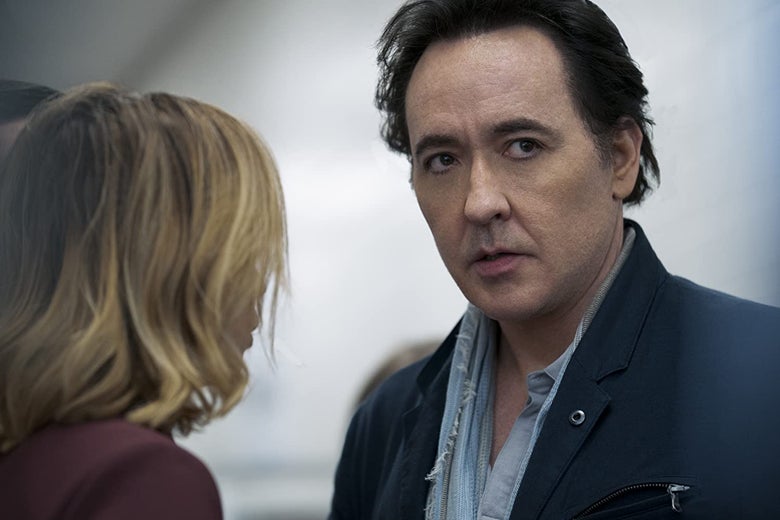
There’s a longstanding myth that director John Frankenheimer’s 1962 conspiracy thriller The Manchurian Candidate was pulled from release in response to the assassination of John F. Kennedy. That never happened—the movie’s theatrical release had already run its course by the time Kennedy was killed—but it seems like something that might have happened, and better yet, it’d be a good story if it had happened, which is more than enough to keep a conspiracy theory alive for decades. After the Sept. 11 attacks, a wide array of movies and television shows really did get the Manchurian Candidate treatment, as filmmakers delayed, cancelled, or altered their work to remove references to terrorism or shots of the World Trade Center. It wasn’t a question of censorship so much as it was just reading the room—something the people behind Amazon Prime’s spectacularly ill-timed new conspiracy thriller Utopia really should have considered.
The show is a remake of the 2013 Channel 4 series written by Dennis Kelly. The original version was a brightly-colored mixture of conspiracy theories and comic-book violence, anchored by delightful scenery-chewing villainy from Stephen Rea, Geraldine James, and James Fox and a memorable and disturbing performance from Neil Maskell in the role of an Anton Chigurh–style weirdo killer. The new version, written by Gone Girl author Gillian Flynn, swaps in an American cast that includes Jessica Rothe, Rainn Wilson, and John Cusack. Both versions of the show have the same plot engine: A group of comic book fans discover an unpublished manuscript for a graphic novel that they believe holds clues about the future; shadowy forces are also looking for the same manuscript, and eventually the comic book fans uncover a global conspiracy. So far, so run-of-the-mill.
But the nature of that conspiracy plays very differently in 2020 than it did in 2013, and the results are catastrophic. (Spoilers for both versions of Utopia follow.) As the characters discover, the reason the comic book contains clues to things that haven’t yet happened is that it was drawn by one of the architects of a plan designed to stave off planetary collapse as the population rises and the fossil fuels run out. Here’s the plan:
1. Convince the general public that there is an outbreak of a deadly new virus. To sell the story, poison or otherwise kill people, then attribute their deaths to the phony virus.
2. Once the fake pandemic is up and running and the public is terrified, announce that there is a vaccine that can defeat the virus.
3. With the help of global elites, NGOs, and world governments, inject everyone on the planet with this “vaccine,” as quickly as possible.
4. Surprise! The vaccine is designed to permanently sterilize all or all but a certain percentage of the people who take it. Sit back and relax as the global population drops from 7.8 billion to about 500 million in a single generation, ushering in a new era of plenty.
You can probably see the problem here, and it’s an insurmountable one. We are in the middle of an actual pandemic, a staggering number of Americans sincerely believe that that pandemic is a politically motivated hoax, and an equally staggering number believed vaccines were harmful years before COVID-19 emerged. It’s not the filmmakers’ fault we’re in this mess; it’s not their fault so much of the public is superstitious and gullible; and it won’t be their fault if Utopia gives some dumbass the confidence they need to quit wearing a mask and infect and kill you or the people you care about. Make whatever art you like—the audience isn’t your problem! But if you’ve made something about a scrappy group of kids uncovering a giant conspiracy, and it turns out that in the time since you finished shooting, that exact conspiracy theory has suddenly revealed itself to be (A) believed by a significant portion of the population and (B) deadly, it might not be a bad idea to push the release date.
Even if everyone who sees Utopia is capable of distinguishing fact from fantasy—and that’s vanishingly unlikely in a nation that is sending QAnon followers to Congress—it’s impossible to enjoy a story where the heroes convince themselves that shadowy forces have manufactured a phony pandemic to trick people into taking a dangerous vaccine when those exact beliefs are helping to kill hundreds of thousands of Americans. Every time the Utopia kids uncover another piece of the conspiracy, it’s a new invitation to contemplate just how screwed we are. There’s nothing wrong with extending that invitation, but it’s better to do it intentionally, not as an accident of history.
If the country ever gets to the other side of this pandemic, there may come a time when Utopia can be appreciated for what it is: an inferior American copy of a pretty good British TV show. But 2020 is not that time. We wouldn’t have to be living in a perfect society for Utopia to play the way it’s supposed to, but we’d need to build something better than this. If any shadowy elites have a plan to get us there, this is your moment.
Entertainment - Latest - Google News
September 26, 2020 at 04:30AM
https://ift.tt/3cwfXsC
Amazon's Utopia remake should never have been released in 2020 (spoilers). - Slate
Entertainment - Latest - Google News
https://ift.tt/2RiDqlG
Bagikan Berita Ini














0 Response to "Amazon's Utopia remake should never have been released in 2020 (spoilers). - Slate"
Post a Comment